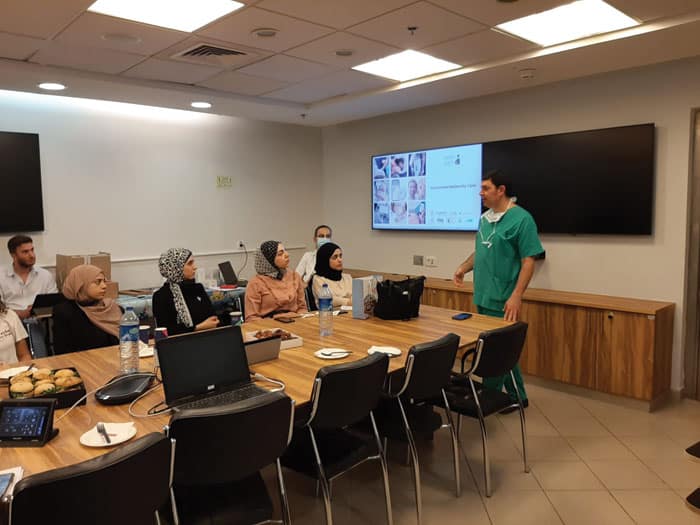 Photo courtesy Sheba Medical Center
Photo courtesy Sheba Medical Center The Israeli-Palestinian conflict is ever-present in the Middle East. However, a new program aims to nurture hope and co-existence by improving the lives of Palestinian women in disadvantaged areas.
Sheba Medical Center, Israel’s largest hospital, is collaborating with Project Rozana, a non-profit organization that aims to strengthen relationships between Israelis and Palestinians through healthcare. The project takes Sheba’s OB-GYN Beyond – a virtual OBGYN department – into rural Hebron and trains female Palestinian healthcare workers to run it.
“This project is important because it focuses on cross-border community building and peaceful co-existence between Israelis and Palestinians while bridging critical healthcare education and delivery gaps for Palestinian women and children in rural communities,” said Ronit Zimmer, executive director of Project Rozana.
Dr. Avi Tsur, director of the Women’s Health Innovation Center at Sheba and director of OB-GYN Beyond, is heading the team that is training and supporting 12 Palestinian healthcare professionals, including gynecologists, a pediatrician, nurses, a midwife, a nutritionist and a dentist. The women are learning about the cutting-edge and remote care technologies that enable OB-GYN Beyond to function, and they are interacting with hundreds of women and children, as well as their families, through this program.
“Our goal at OB-GYN Beyond is to provide women with the medical care they need, wherever they are located,” said Tsur. “Telemedicine allows us to bridge geographical, political and cultural gaps in the shared vision of optimal health outcomes.”
The World Health Organization and other regional healthcare stakeholders identified more than 145,000 Palestinian women and children from rural communities that are at risk due to limited or no access to sexual reproductive and primary healthcare. Factors like transportation issues, a lack of infrastructure and cultural and financial barriers create obstacles to accessible healthcare services.
“The pandemic has amplified these factors by forcing a scaling-down of services by major healthcare providers, and decreasing the number of women seeking healthcare,” said Zimmer. “This has exacerbated pre-existing health issues in women of all ages, alongside gender-based violence.”
Sheba already serves patients from the West Bank and Gaza Strip for urgent care every day and engages in efforts with the Palestinian Authority to train and educate doctors.
”Palestinian and Israeli health professionals have an effective history of cooperation, and thousands of Palestinians have studied and trained in Israeli healthcare institutions.” – Ronit Zimmer
“While Israelis and Palestinians live in protracted conflict, limited cross-border interaction is a recent phenomenon that denies positive opportunities to meet and enables distrust to thrive,” said Zimmer. “Yet, Palestinian and Israeli health professionals have an effective history of cooperation, and thousands of Palestinians have studied and trained in Israeli healthcare institutions.”
Zimmer points to research that nurses, doctors, midwives and other healthcare professionals can play a role in peacebuilding between nations.
“[We] see the health arena as fertile terrain for advancing peacebuilding in the region,” said Zimmer. “No less important, quality healthcare is a key pillar of highly functioning societies and supports the long-term interests of the Palestinian people by laying the groundwork for effective Palestinian institutions.”
The initiative is the first of its kind in the region, and so far, it’s been successful in three rural areas in the West Bank, according to Zimmer.
The initiative is the first of its kind in the region, and so far, it’s been successful in three rural areas in the West Bank, according to Zimmer.
“We have had very positive feedback from patients and communities, especially with the use of the remote care devices, which they have never been exposed to,” she said. “I was sent photos from the team’s nutritionist, who, together with the dentist, delivered a seminar on good eating for healthy bodies and teeth. It was very well received.”
This year is the pilot year for the joint project between Sheba Medical Center and Project Rozana. In the future, the hope is to expand the program and encourage other peacebuilding efforts between Israelis and Palestinians.
Zimmer said, “This project can inspire future collaborations between Israeli and Palestinian hospitals, bringing together increased numbers of medical professionals in different fields, thereby increasing the numbers of community influencers and building large-scale trust on the ground.”






















 More news and opinions than at a Shabbat dinner, right in your inbox.
More news and opinions than at a Shabbat dinner, right in your inbox.